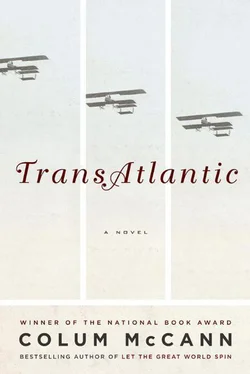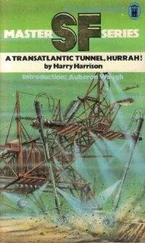I stammered a moment, then told the policewoman that I knew a couple who lived nearby, in the direction of Donegall Square.
“Call them,” she said, thrusting a mobile phone at me, but I surprised her with my BlackBerry. Jack answered after the very first ring. He, too, sounded like he had a little vermouth on his tongue. I asked if I could stay the evening. He was confused and I bawled down the phone that they were going to throw Georgie and me in jail for the night.
“Georgie?” he said, and then he remembered. “Oh, Hannah.” Some muffled complaints in the background, a complicated sigh.
The policewoman hesitated a moment, then said she would drive behind me to make sure I got where I wanted. I must have wobbled a little bit because she pulled me over again and drove the car herself while her partner continued behind us. She said that it was pathetic at my age to be drinking and driving, and if it wasn’t for the dog she would have arrested me there and then. She looked like the sort of woman who had once, long ago, had a steel rod expertly inserted up her backside. It would hardly emerge now. I was tempted to tell her my exact history with Jack Craddogh, just to see if I could coax a smile out of her — he actually bit the very last button off my dress, pretended to swallow it, kissed me — but I sat quietly beside her, properly chagrined and said nothing. We were all young once: my mother used to say we should make sure to drink the wine before it turns.
We pulled up to Jack’s large Victorian. He stood framed in the doorway under the stained glass, still a tall elegant man. His wife, Paula, lurked in a dressing gown beside him.
Jack came down the path, carrying his age, and opened the small ironwork gate and shook the hand of the policewoman, assured her that he had it all taken care of, he’d make sure I had a good night’s sleep. He seemed a little miffed at the idea of looking after Georgie, too, but I walked her through the renovated house — high ceilings and transoms and rich wallpaper and old paintings — and put her out on the small back patio where she rested her head on her paws and resigned herself to her fate.
The three of us sat at his kitchen table, surrounded by expensive modern machinery, drinking tea, the past banging its flint against the present. Jack had become a birding enthusiast in recent years, a description which almost made me spit up my tea in laughter. The oystercatcher, the wigeon, the black-tailed godwit. He and his wife had taken to sketching the birds in the area. They had often contemplated calling across to my cottage, they said, but hadn’t quite made it, the time slipped away from them. I had to admit that the watercolor sketches were quite beautiful and they made me question my own use of time: out there sitting, swimming, watching, waiting.
The thought of the cottage brought a mawkish mist to my eyes, names washed away by decades of rain, and I stammered something about the idea of sketching flight.
Jack broke the seal on a bottle of brandy, and we warmed ourselves with talk of his other ongoing project: he had largely retired, but was still teaching one course on nineteenth-century history at Queen’s. His fascination was what he called the literature of the colonial. He spoke slowly, as if chewing his words. His hands were liver-spotted. He poured the brandy with a slight shake.
After a second glass Paula announced that she would leave us youngsters be — she actually used the word youngsters —and Jack stood to accompany her out of the room, and his hand brushed against her rear end, which seemed a tremendous act of bravery in the circumstances. He kissed her flush on the lips as if to reassure her. I heard her clomping up the stairs with another sigh.
“So,” he said, as if everything between us had begun anew, and my hand was still hovering barely above his laboring heart. “What brings you to these parts, Hannah?”
I had the unpleasant sensation that my life was circling around again, only I was even more unequipped for it than ever. He knew of the letter from years gone by, but had never actually seen it. It was, he said, the first time he had ever come upon an actual living conceit . I didn’t quite know what he meant, and I was tempted to rip the letter open right there in front of his eyes, just to destroy the assertion. My life and my house didn’t seem a conceit to me at all: it was an actual, breathing place where gulls dropped shells from on high, and where the doors had to be closed to keep in the heat, and where the ghosts had to duck their heads when they walked through the low rooms. I don’t suppose Jack Craddogh was too astounded that I and my family had somehow squandered most of my late grandfather’s linen money down over the years.
I was careful how I revealed the details, but he said there was very little hope that the university would be willing to take a chance on an unopened letter no matter what sort of verification could be given.
But the letter clearly piqued his interest. He was aware of the Douglass connection: it had, he said, become fashionable of late for the Irish to think themselves tremendously tolerant. He used the word they like a doorway he could open and close. The academic question was when, in fact, they , the Irish, had become white. It was stitched in with notions of colonialism and loss. He had studied political figures in Australia, Britain, and the Tammany Hall of old New York, and how they braided into the literature of the time, how this whiteness emerged. He was wary of scholars who aligned themselves too closely with what he called the darker edges. It all seemed a little too dust-choked for me. But he knew, he said, a number of scholars who were studying Douglass’s time in Britain and Ireland. He could put me in touch with one of them, David Manyaki, from Kenya, who was teaching in university in Dublin.
I felt myself rather dizzy with all the geography and the brandy. He rattled on about some notion of inner colonization and he broke a little smile when I began to yawn. I really needed some rest, I told him. I didn’t have the capacity for absorption that I once had. He smiled at me, put his hand upon mine, kept it there a moment, looked me directly in the eye until I glanced away. I could hear his wife pacing the floorboards above: putting towels and a toothbrush and a nightgown on the guest bed, no doubt.
He tried to lean towards me. I have to admit it was somewhat flattering. I said I would file it under fatigue rather than desire. Seventy-two years old: some things remain better off remembered.
THE MORNING BROKE bright and cold. The air snapped. The high gothic towers of the Lanyon Building stood stark against a very blue sky. The students walked brisk and short-haired along the manicured paths.
My own days in the university in the late 1950s were quick and shallow. Literature had not prepared me for pregnancy at nineteen. My sweetheart from Amsterdam returned to his canals. I could hardly blame him. I was, for a long time, the sort of failed Presbyterian girl who sucked her hair into endpoints and spouted on about revolution and justice. He was terrified, poor boy. He sent money every Christmas, until one year the envelopes just vanished altogether, and Tomas never got a chance to see him.
Tomas’s days at university were cut short, too. When I dropped him off, in 1976, there were students out along the footpaths with their Martin Luther King posters and Miriam Makeba T-shirts. Eight years since the Troubles began and they were still singing: We shall overcome . Tomas drifted among them. A hopeful shine in his eyes. He wore his hair curly and his bell-bottoms wide. He was once part of a student occupation where they took over the arts building and they were foolish enough to release white doves out the window. He grew quieter as the days went on. Put his head in his maths books. He never quite had both oars in the water, but he thought he might become an actuary. The length of lives, the probability of survival. No formula for our ironies. What was it like, that dark morning, when a couple of masked men parted the bushes? What small tremor came upon him when he clutched a bullet to his stomach?
Читать дальше












